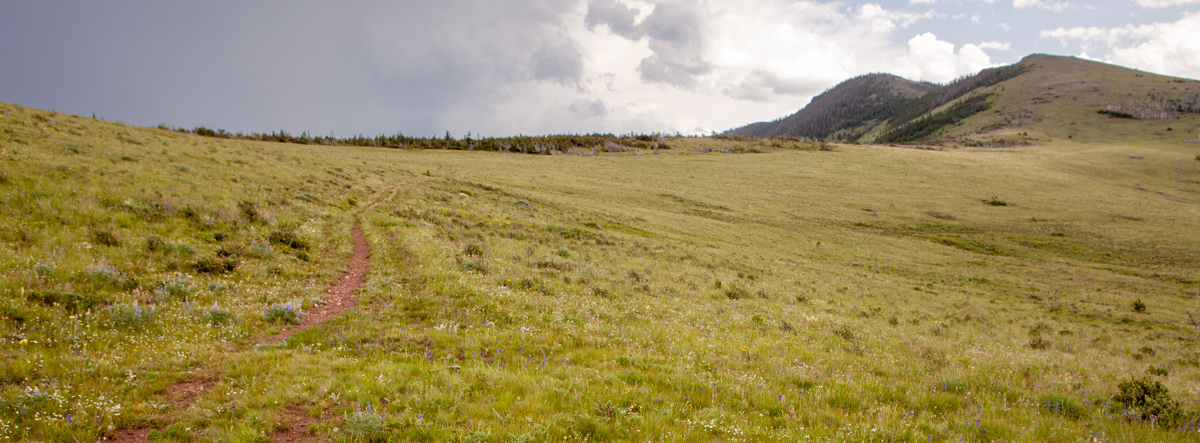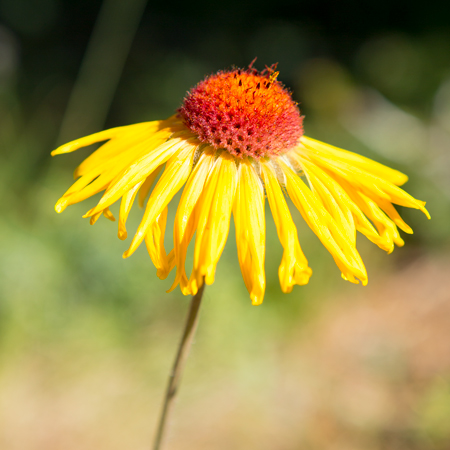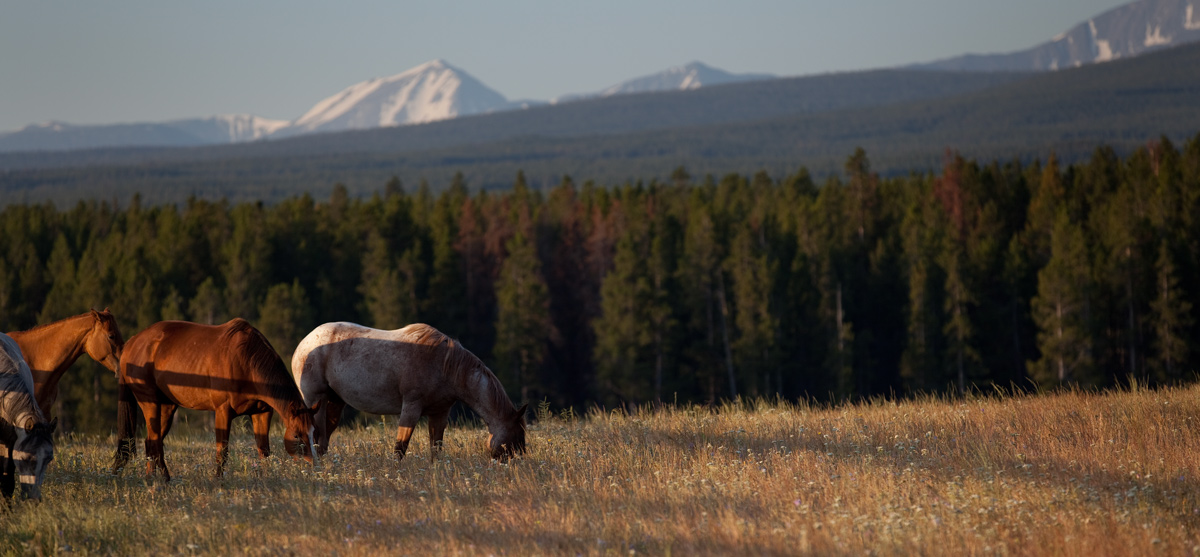Lewis and his group follow the Road to the Buffalo cresting the Rocky Mountains. His dog Seaman is bitten by a beaver and Pvt. Reubin Field wounds a moose. They also see fresh signs of bison.
In the Big Hole Valley, Clark‘s group wakes with several horses missing. Sgt. Ordway and three others spend the day finding them while Clark moves across the valley towards Fortunate Camp.[1]For more on the captains’ strategy and various groups after leaving Travelers’ Rest, see Dividing Forces at Travelers’ Rest.
Lewis Back on the Plains of the Missouri
by Yellowstone Public Radio[2]Originally aired weekdays by Yellowstone Public Radio during the Bicentennial observance of 2003-2006. Narrated by Hal Hansen. Scripts by Whit Hansen and Ed Jacobson. Produced by Leni Holliman. © … Continue reading
Lewis: Lewis and Clark Pass
Lewis and Clark Pass (view east)
© 2 July 2013 by Kristopher K. Townsend. Permission to use granted under the Creative Commons Attribution-Share Alike 4.0 International license.
Wounded a Moose
halted to dine at a large beaver dam the hunters killed 3 deer and a fawn. deer are remarkably plenty and in good order. Reubin Fields wounded a moos [Moose] deer this morning near our camp. my dog [Seaman] much worried.
—Meriwether Lewis
Over the Rockies
N 45 E. 2 m. passing the dividing ridge betwen the waters of the Columbia and Missouri rivers at ¼ of a mile. from this gap which is low and an easy ascent on the W. side the fort mountain [Square Butte] bears North Eaast, and appears to be distant about 20 Miles.
—Meriwether Lewis
Buffalo Signs
saw some sighn of buffaloe early this morning in the valley where we encamped last evening from which it appears that the buffaloe do sometimes penetrate these mountains a few miles. we saw no buffaloe this evening. but much old appearance of dung, tracks &c.
—Meriwether Lewis
Blanketflower
Gaillardia aristata
Lewis and Clark Pass, 1 July 2015. © by Kristopher K. Townsend. Permission to use granted under the Creative Commons Attribution-Share Alike 4.0 International license.
Blanketflower Specimen
Rocky mountains Dry hills. Jul 7th 1806.
—Meriwether Lewis[3]Gaillardia aristata. Moulton, ed. Herbarium, specimen 73.
Weather Diary (Lewis)
State of the weather at rise
Wind at rise
State of the weather at 4 P. M. Wind at 4 P. M. cloudy after rain, thunder & lightning S W cloudy after fair & rain W a cloud came on about sunset and continued to rain moderately all night. rained at 3 P. M.
—Meriwether Lewis
Clark: Big Hole Valley
Horses Grazing in the Big Hole Valley
© 26 July 2011 by Kristopher K. Townsend. Permission to use granted under the Creative Commons Attribution-Share Alike 4.0 International license.
Scattered Horses
This morning our horses were very much Scattered; I Sent out men in every direction in Serch of them. they brought all except 9 by 6 oClock
—William Clark
Crossing the Big Hole
at ½ past 10 A M I set out and proceeded on through an open rich vally crossing four large Creeks with extensive low and mirey bottoms, and a Small river keeping the Course I had set out on S. 56° E after crossing the river I kept up on the N E. side, Sometimes following an old road which frequently disappeared
—William Clark
Hot Springs
at the distance of 16 miles we arrived at a Boiling Spring . . . . I directt Sergt. Pryor and John Shields to put each a peice of meat in the water of different Sises. the one about the Size of my 3 fingers Cooked dun in 25 minits the other much thicker was 32 minits before it became Sufficiently dun.
—William Clark
Big Hole Pass
passed through a gap of a mountain on the Easterly Side of which we encamped near some butifull [Nicholas Biddle: Springs] which fall into Willards Creek.
—William Clark
Weather Diary (Clark)
State of the weather at Sun rise Wind at Sun rise State of the weather at 4 P. M Wind at 4 P M. cloudy after rain W. fair after rain S W by W Saw a blowing Snake. a violent rain from 4 to ½ past 5 last evening & Some rain in the latter part of last night. a small Shower of rain at 4 this morning accompanied with wind from the S. S. W.
—William Clark[4]To assist the reader of this web page, the date column is omitted and some abbreviations have been spelled out.
Ordway Gathers Lost Horses
I and the 4 men went out in different directions to look for the 9 horses I and Labuiche [Labiche] went up a valley which led in the mountn. towards the ShoShones [Lemhi Shoshones] nation. got on the track of the horses and followed it on untill towards evening and found them still going on an Indn. road. we turned them back to the last nights Camp.
—John Ordway
Experience the Lewis and Clark Trail
The Lewis and Clark Trail Experience—our sister site at lewisandclark.travel—connects the world to people and places on the Lewis and Clark Trail.
Plan a trip related to July 7, 1806:

Alice Creek Historic District is a High Potential Historic Site along the Lewis and Clark National Historic Trail managed by the U.S. National Park Service. The trail to the summit is managed by the Helena National Forest.
Notes
| ↑1 | For more on the captains’ strategy and various groups after leaving Travelers’ Rest, see Dividing Forces at Travelers’ Rest. |
|---|---|
| ↑2 | Originally aired weekdays by Yellowstone Public Radio during the Bicentennial observance of 2003-2006. Narrated by Hal Hansen. Scripts by Whit Hansen and Ed Jacobson. Produced by Leni Holliman. © 2003 by Yellowstone Public Radio. |
| ↑3 | Gaillardia aristata. Moulton, ed. Herbarium, specimen 73. |
| ↑4 | To assist the reader of this web page, the date column is omitted and some abbreviations have been spelled out. |





